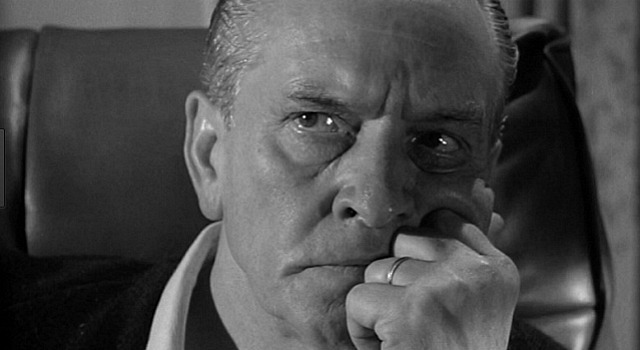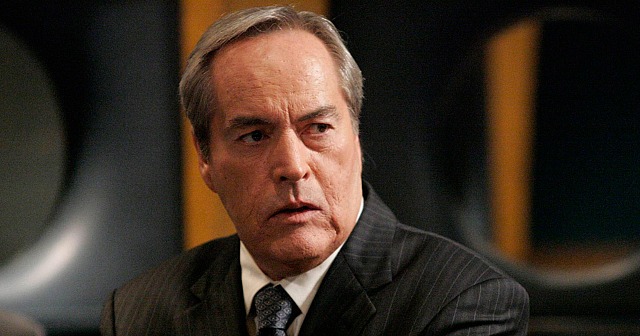In a just-posted cover story, People‘s Sandra Sobieraj Westfall writes that former President Barack Obama delivered the following opinion about President Donald Trump: “He’s nothing but a bullshitter.” The remark was shared early last November, and comes second-hand from two friends of Obama’s. Has Obama’s opinion changed since Trump has been in office? “Well,” said one of the sources, “it hasn’t gotten any better.”
 Jeffrey Wells
Jeffrey Wells
Shady Russian Cash Flows
Last Friday AlterNet‘s Steve Rosenfield and others began writing about a pair of 45-minute Dutch-produced docs focused on President Donald Trump, one of which alleges that Trump has “extensive connections to Russia’s ruling oligarchs and a history of illegal racketeering.”
Doc #1, The Dubious Friends of Donald Trump, Part 1: The Russians, broke last week. Produced by Zembla, it examines Trump’s alleged relationship with, among others, Russian mobster Felix Sater and the people behind Bayrock LLC.
Rosenfield says it also examines Trump’s arrangements with wealthy Russians involved in elaborate pyramid–style money laundering. The financial trail raises questions about whether Trump canned FBI director James Comey “because the FBI’s investigation of his campaign’s collusion with Russia was encroaching into Trump’s world of dark money and dubious business partners.'”
Gun Goes Off Tomorrow
The excitement at the start of any Cannes Film Festival is always tingly, and this year is no exception. The La Pizza press gathering was full of that fizzy stuff. I’ll be dutifully attending Wednesday’s 10 am press screening of Arnaud Depleschin‘s Ismael’s Ghosts, the opening-night attraction. But the real hummer, at least in terms of expectations, is Andrey Zvyagintsev‘s Loveless, which screens for journos at 7:30 pm in the Salle Debussy.
The Depleschin flick, which costars Mathieu Amalric, Marion Cotillard, Charlotte Gainsbourg and Louis Garrel, is about a director (Amalric) whose life is complicated by the return of a former lover (Cotillard) just as he’s about to begin shooting a new film. Zyyagintsev’s film focuses on a bickering married couple, verging on divorce, whose son disappears after one of their fights. They try to put their differences aside as they search for him.
Here I am still filing at 2:30 am. I could’ve crashed hours ago, but I had to put stuff up.



La Pizza table #1 (clockwise from left): Guardian/Vanity Fair critic & contributor Jordan Hoffman, Indiewire critic David Ehrlich, Variety critic Owen Gleiberman, Indiewire editor/columnist Anne Thompson (half-obscured), First Showing‘s Alex Billington, Film Society of Lincoln Center deputy director Eugene Hernandez, critic Tomris Laffly (Film Journal, Time Out New York, Vulture), [standing] TheWrap‘s Ben Croal, Indiewire‘s Eric Kohn, Vulture‘s Kyle Buchanan (left profile, half obscured), New York/Vulture‘s Jada Yuan, Screen Daily‘s Tim Grierson, Washington Post critic Ann Hornaday, Vanity Fair‘s Rebeca Keegan.

La Pizza table #2 (clockwise from left): Film School Rejects Matt Hoffman, WeLiveEntertainment’s Tanner Stechnij, Time critic Stephanie Zacharek, L.A. Times critic Justin Chang, Toronto Star critic Peter Howell, Maclean‘s Brian Johnson, David Scott Smith (obscured), Svetlana Cvetko (profile, staring at table), Alia Salazar, Michelle Foster of Loyola University.
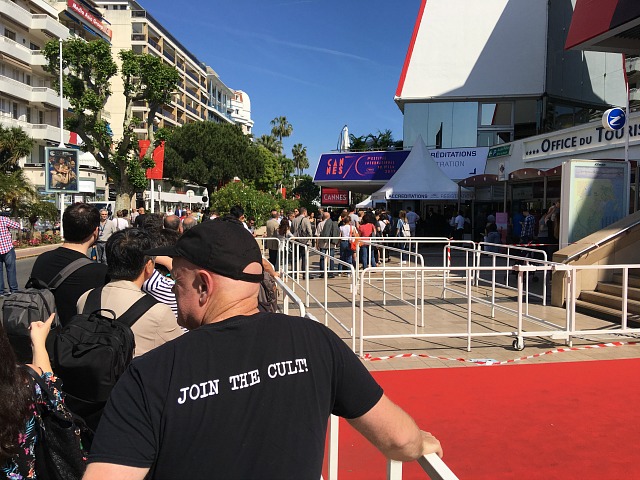
300 Euro Mistake
I awoke Tuesday morning at 5 to catch a 7:20 am train to Cannes. Finished packing, tidied up, had a coffee, called for an Uber. Everything felt right and well-ordered. I left the apartment keys on the kitchen counter and dragged two bags — a 24-inch upright suitcase and a leather carrying bag — onto the third floor landing, and for some drooling, jelly-brained reason closed the apartment door with my computer bag still sitting inside.
Did I just do that? My mind went into freeze-panic mode. I’ll be missing my train, but how and when can I get back into the pad? My goal was to somehow do this, snag the bag and catch a 10:19 am train to Cannes from Gare de Lyon. Four hours hence.
I texted Romain, my Airbnb contact guy, but he didn’t answer until 7:40 am. When he finally replied he said I couldn’t get back in until the cleaning person arrives, which would be about noon. I begged him to call this person and offer a 50-euro reward to show up by 9:30 am. A few minutes later I upped it to 75. Romain said he’d try — “It’s not an issue of money” — but that I shouldn’t get my hopes up. A few minutes later I said I’d gladly and happily pay the cleaning person 100 euros to show up early, no questions asked.
Two or three minutes later Romain revealed that he himself had a key to the apartment (new information!) but not the street door or foyer-door key. But he would figure something out. He offered to meet me at the place by 9 am. When I got there he was waiting across the street with my computer bag. I gave him the hundred euros and a pat on the shoulder, and tore off to Gare de Lyon.
Can Michael Moore Go Home Again?
I somehow doubt that Michael Moore‘s forthcoming anti-Trump doc, Fahrenheit 11/9, will shake up or double-clarify perceptions of the deranged Trump circus. I say this as a staunch fan and ally of nearly every Moore viewpoint and documentary going back to Roger and Me, but what can he say or show that isn’t on the web and cable news every day?
What half-reasonable person could possibly support this unhinged authoritarian orangutan at this stage of the game, post-Comey firing and sharing of hush-hush intelligence with the Russians plus the just-revealed Comey memo about Trump asking him to shut down investigations of former national security adviser Michael Flynn? And yet a third of the country does. Because Trump is the only thing standing between them and the multicultural lefties, and that, to rural nutters and dumbshits, is the primal thing. White rule is on the ropes, and they don’t want to know or hear anything else.
Fahrenheit 11/9 will most likely illuminate and confirm what sane people already think, and yes, it’s conceivable that the the content might help to weaken support among Trump’s “soft” supporters, but the crazies are immovable.
Moore has himself acknowledged this problem in a press-release statement about Fahrenheit 11/9, which Bob and Harvey Weinstein‘s Fellowship Adventure Group will release, presumably later this year.
“No matter what you throw at him, it hasn’t worked,” Moore said about Trump. “No matter what is revealed, he remains standing. Facts, reality, brains cannot defeat him. Even when he commits a self-inflicted wound, he gets up the next morning and keeps going and tweeting.” And yet, Moore insisted, “That all ends with this movie.”
Fine — maybe it will on some level. I just can’t imagine how. A documentary can’t hope to reach these loons. They’re over the waterfall and don’t give a damn.
Great Operatic Anguish
Some of you presumably saw or at least remember Werner Herzog‘s Woyzeck (’79), an adaptation of George Buchner‘s 19th Century play of the same. Tonight I joined Svetlana Cvetko and David Scott Smith for an opera version of same at the Bastille Opera. It was the final night of the season. Afterwards we had some exquisite eats at Camille (24 Rue des Francs Bourgeois, 75003 Paris), which Svetlana recommended and is definitely a place I’ll be returning to. Now I have to crash. It’s 12:18 am, and I have to wake up at 5 am (okay, 5:15) to make the Paris-to-Cannes train at Gare de Lyon.
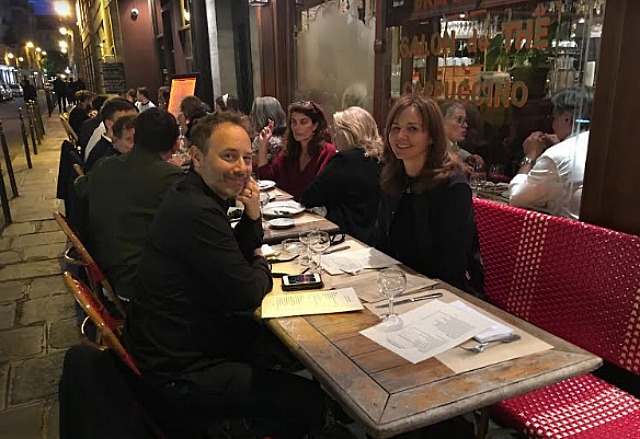

Just Like That, Brad Grey Is Gone
A couple of months ago (March 14th) I ran into Brad Grey at the Wilshire Screening Room. I was there for my second viewing of Cristian Mungiu‘s Graduation.
“Have you seen it?” I asked Grey. He shrugged, shook his head. “You should! It’s brilliant. You know Mungiu…Four Months, Three Weeks, Two Days?” Another 20 or 30 seconds of chit-chat and “see ya.” I liked Grey as far as it went. I felt I could talk freely with him. We had spoken at a Paramount lot gathering a few weeks earlier, and again at a pre-Golden Globes party at the Chateau Marmont. He was fairly open and candid at the former event, at least as far as his position (he was still running Paramount) allowed.
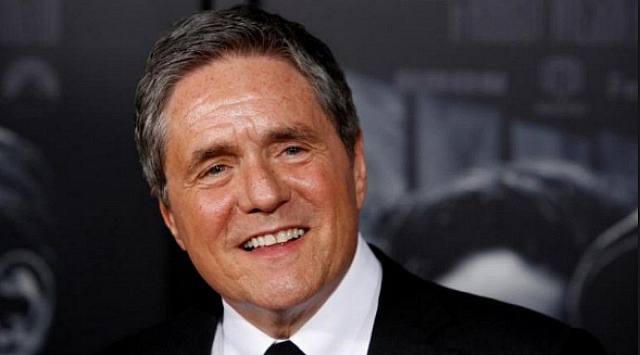
And now he’s gone. Cancer. Jesus, he didn’t look ill or anything. A slap to the system. Heartfelt condolences to his family, friends and former colleagues. This came out of nowhere.
Straight from Variety: “Brad Grey, the former Paramount Pictures chairman and CEO, died on Sunday night of cancer. He was 59. His family issued a statement on Monday morning, Los Angeles time:
“Brad passed away yesterday evening at his home in Holmby Hills, his family by his side. The cause of death was cancer. He was 59 years old.
Never Let The Audience Think About Budget
Two scenes dissipate John Frankenheimer‘s Seven Days in May (’64), an otherwise gripping thriller about an attempted military takeover of the U.S. One of them is fairly ludicrous in its action plotting, and both take your attention away from the story by suggesting that the film was made for a modest sum — something an audience should never be allowed to contemplate.
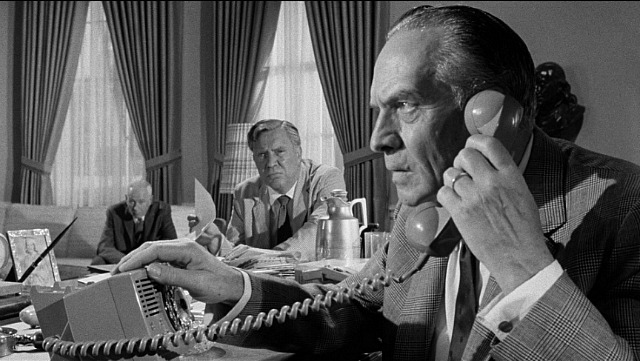
(l. to r.) George Macready, Edmond O’Brien and Fredric March in a second-act scene from John Frankenheimer’s Seven Days in May.
#1: President Jordan Lyman (Fredric March) and a team of anti-conspiracy allies are watching filmed footage of two Pentagon higher-ups (including John Larkin‘s Col. Broderick, a close confidante of Burt Lancaster‘s General James Mattoon Scott) spying on the President’s vacation home from a rowboat. Someone notes that the conspirators must be small in number or else why would Broderick, a Pentagon bigwig, be engaged in routine surveillance work? And it hits you that this whole menacing conspiracy is a small-scale affair. Just six or seven middle-aged men on either side, playing for opposing teams. The film needed a scene or two demonstrating the overwhelming military power that the bad guys had at the ready. Jets, tanks, warships, armed battalions.
#2: A nighttime scene at a secret New Mexico air base (“Site Y”) being used by the bad guys shows Colonel William Henderson (Andrew Duggan) escaping with Senator Ray Clark (Edmond O’Brien) in an open-top military tank. Henderson rifle-butts a soldier and guns the tank over a sand dune and into the night. And nobody chases after them? Site Y security chiefs presumably have all kinds of jeeps and helicopters at their disposal, and they can’t catch a tank driving through the desert at 35 or 40 mph? Broderick and O’Brien should’ve escaped in a chopper. That I would half-buy.
Jean-Luc Godard In Love
I was too distracted to watch when this French teaser for Michel Hazanavicius’s Redoubtable, which will debut at the Cannes Film Festival, appeared online last month. Set in the mid ’60s, the film is about a love affair between legendary nouvelle vague director Jean-Luc Godard and Au Hasard Balthazar and Weekend star Anne Wiazemsky. But what gets me here is Louis Garrel‘s channeling of Godard, particularly the low-key insouciance.
The film, which Godard has allegedly described as “a stupid idea”, is based on Wiazemsky’s writings about her Godard relationship, which began when she was in her late teens. Born in 1930, Godard was 17 years older than Wiazemsky. He wound up casting her in La Chinoise (’67), Weekend (’67) and One Plus One (’68). They were married between ’67 and ’79.
It’s been reported that Wiazemsky was 17 when her affair with Godard began. I’m figuring more like 19. She was born in ’47, and was 18 when Au Hasard, Balthazar (released on 5.25.66) was shot in the summer or fall of ’65. In her book “Jeune Fille” Wiazemsky wrote that Bresson was obsessed with her and never let her out of her sight, so it seems unlikely that Godard was circling her then. The timetable indicates that the Godard coupling began in late ’65 or ’66.
26 year-old Stacy Martin, whose last high-profile role was in Part One of Lars Von Trier‘s Nymphomaniac, plays Wiazemsky. Berenice Bejo (The Artist) costars.
Iconic Image
This is a catchy illustration, but why is Attorney General Jeff Sessions dragging James Comey off the plane with pilot Donald Trump looking on? All Sessions did was rubber-stamp Comey’s dismissal when Trump asked for a written rationale. Sessions was just the puppet, the stooge. Trump was the dragger.
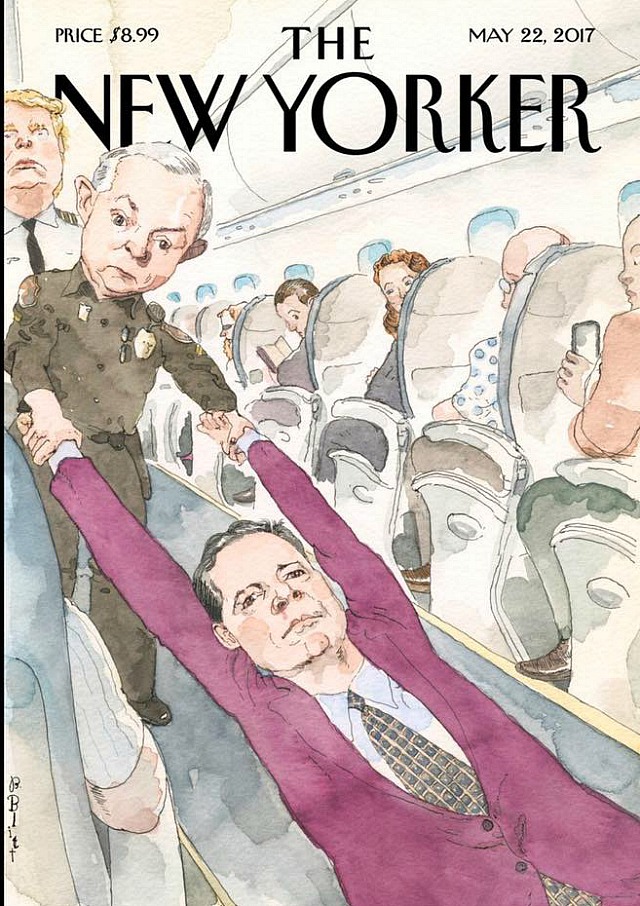
Passing of Powers Boothe
The ghost of Powers Boothe is reading Lawrence Yee’s Variety obit and quietly seething. For Yee’s opening sentence describes Boothe as “a character actor.” Not “the renowned, ruggedly handsome, Emmy Award-winning actor known for his gruff, steely machismo” but “a” character actor. What Yee means is that Boothe’s peak period in the early to mid ’80s doesn’t mean that much, at least to him. But it does, or did, to those who were around and alert during the early Reagan years.
When Tom Cruise dies do you think Variety will describe him as “an” actor? The indignity! For once upon a time Powers Boothe was a brand, a force and a presence that was valued by top-rank directors.
His performance as demonic cult leader Jim Jones in Guyana Tragedy: The Story of Jim Jones was easily the best thing Boothe ever did. Boothe won an Emmy for best lead actor in a limited series. The four-hour, two-part TV movie aired on CBS in April 1980. I haven’t rewatched it since but I would right now if it was streaming, but it’s only on DVD.
Boothe’s movie heyday boiled down to three films that followed Guyana Tragedy — Walter Hill‘s Southern Comfort (’81), John Milius‘s Red Dawn (’84) and John Boorman‘s The Emerald Forest (’85). For a while it seemed as if the Texas-born, conservative-leaning actor might become an Eastwood-like figure. Or at least a regular leading guy.


